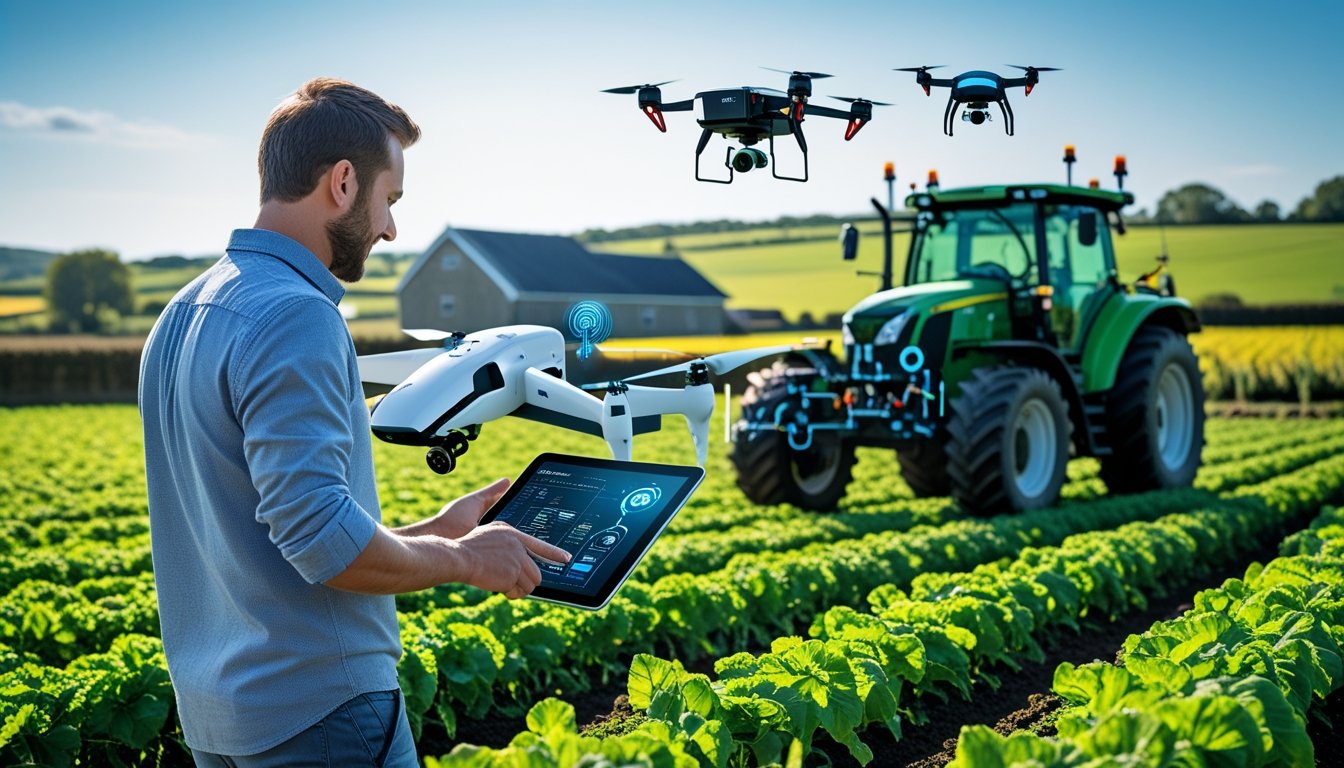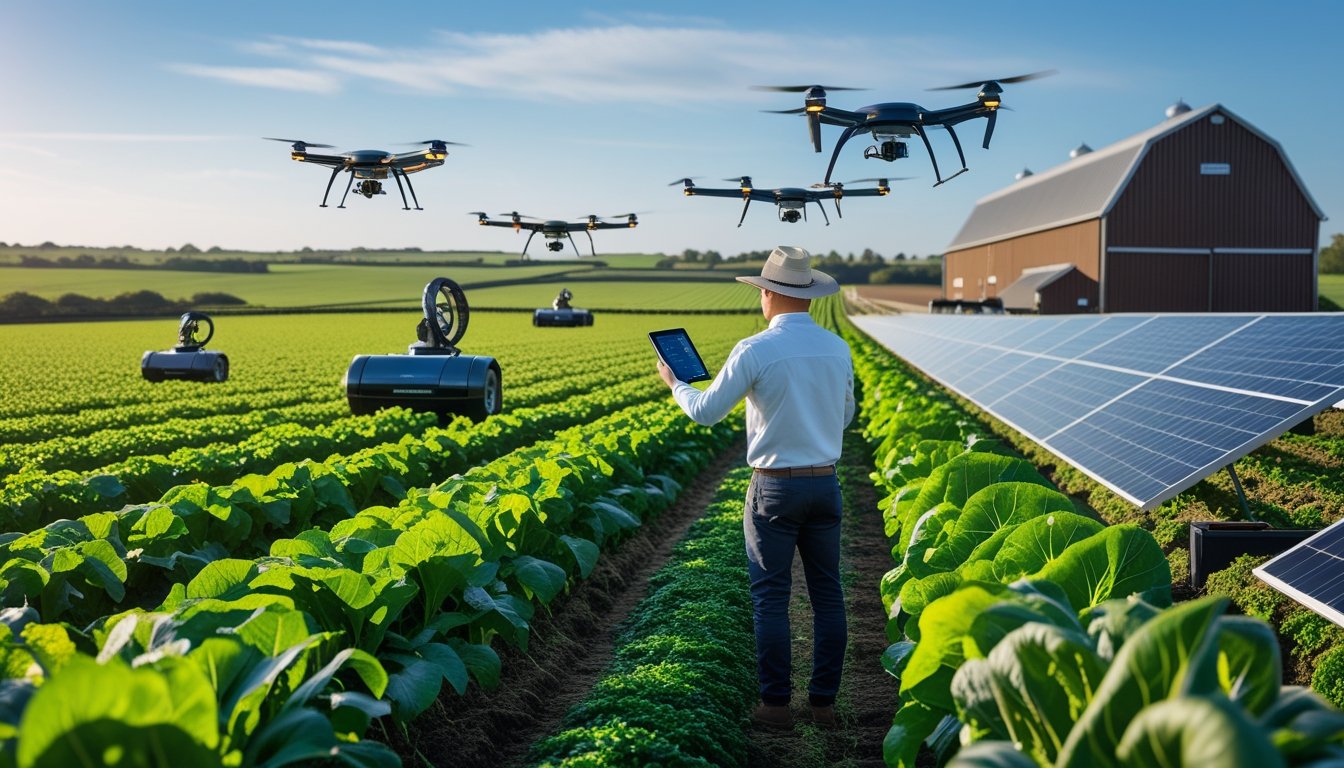Late updated: 21 Sep 2025 15:09
Written by: Oliver Bennett
AI Tools Transforming UK Rural Farming Practices: Innovations and Impacts
In recent years, technology has radically shifted the landscape of agriculture in the United Kingdom. Artificial Intelligence tools are at the forefront of this transformation, significantly enhancing the productivity and sustainability of rural farming practices. From the use of predictive algorithms to advanced precision farming tools, AI enables farmers to make more informed decisions, optimising resources and increasing yields.

AI's integration into farming has opened the door to practices that were once deemed impossible or impractical. Smart farming tools allow for precise monitoring and management of resources such as water and energy, ensuring that every drop and unit are utilised effectively. This boost in efficiency not only improves crop output but also significantly reduces environmental impact—a key consideration in today’s agricultural sector.
Furthermore, by leveraging AI, we are witnessing improvements in livestock farming, with projects focused on increasing feed efficiency and reducing greenhouse gas emissions. These advancements underscore the importance of AI in securing a sustainable future for British agriculture, making our rural farming practices more resilient and adaptive to future challenges.
Key Takeaways
- AI tools enhance the efficiency and sustainability of UK farming.
- They significantly improve resource management and crop yields.
- AI advances are crucial for the future resilience of British agriculture.
How AI Tools Are Transforming UK Rural Farming
Artificial intelligence is reshaping agriculture in the UK, enhancing productivity and sustainability. Our focus includes technologies enabling precise crop management, insightful data-driven decisions, and improved animal welfare.
Precision Crop Management and Smart Farming
AI in agriculture offers transformative possibilities for crop management through tools like precision agriculture. This involves using GPS and satellite imagery to monitor fields with unparalleled accuracy. With AI, we can analyse soil health and predict optimal planting times. Smart farming technologies also facilitate efficient water usage, reducing waste and ensuring crops thrive.
Machine learning algorithms allow for real-time monitoring of crop health. We can quickly address pest infestations or nutrient deficiencies, avoiding economic losses. As a result, precision farming not only boosts crop yield but also promotes sustainable farming practices across the UK.
Data Analytics, Predictive Insights, and Decision-Making
Data analytics provides predictive insights that are critical for decision-making in farming. AI tools analyse vast amounts of data, offering valuable forecasts on weather patterns and market trends. We can anticipate changes and adapt our strategies effectively.
Predictive analytics aids in enhancing resource management. By foreseeing weather changes, farmers can plan irrigation schedules meticulously and reduce water wastage. Predictive modelling also helps prevent crop diseases by forecasting likely pest outbreaks, ensuring timely intervention.
These data-driven insights empower farmers to make informed decisions. With AI, we can discuss economic strategies, anticipate challenges, and explore opportunities more intelligently. It’s about transforming traditional farming into a tech-driven, proactive initiative.
Livestock Monitoring and Animal Welfare Technologies
AI is not just about crops; it extends to livestock management too. Technologies like robotic milking machines automate processes, improving efficiency and consistency in milk production. Such machines enable us to monitor animal health, identifying issues early and ensuring timely care.
Advanced tools track livestock movements and behaviour, offering insights into overall animal welfare. By analysing data on animal health, we can implement tailored feeding regimens that promote productivity while ensuring ethical treatment.
Additionally, AI systems can predict health issues before symptoms appear, allowing for early intervention. Ensuring animal welfare through these smart technologies promotes sustainable, ethical farming practices that benefit both the industry and the animals in our care.
Driving Sustainability, Resource Efficiency, and Food Security in UK Agriculture

In UK agriculture, the integration of AI is pivotal in promoting sustainability, enhancing resource efficiency, and ensuring food security. These advancements are crucial in addressing environmental impacts and maintaining a robust food supply.
Sustainable Farming Practices and Environmental Impacts
Sustainable farming practices are essential to reducing the carbon footprint of agriculture. We can utilise AI to monitor soil conditions and optimise crop rotation, enabling precise application of resources like water and fertiliser. The impact includes minimal waste and decreased environmental harm. Additionally, AI-driven energy management helps keep energy consumption low, making farming operations more environmentally friendly. Embracing such practices is vital for adapting to climate change effects and safeguarding the ecosystem.
Food Supply, Security, and Advanced Traceability Solutions
Ensuring food security involves maintaining a reliable supply chain, where AI tools play a significant role. By employing predictive analytics, we can forecast potential shortages or surpluses in production. This allows us to adjust supply chains more accurately. Blockchain technology offers transparency and traceability, maintaining high standards of safety and quality within the food supply. Advanced traceability solutions also improve consumer confidence, while smart sensors ensure quality control, upholding robust security measures throughout the production process.
Adoption Challenges, Innovations, and Future Opportunities
The integration of AI into agriculture, while promising, presents challenges. Initial costs and technical knowledge remain significant barriers. However, the ongoing development of user-friendly tools is making AI more accessible. Innovations such as IoT-based systems provide continuous data streams to enhance decision-making processes. Opportunities lie in expanding precision farming practices, allowing for greater resource efficiency. As we advance, collaboration between tech manufacturers and farmers will be essential to overcoming these challenges, ensuring both small and large-scale farmers can benefit from these technologies.
